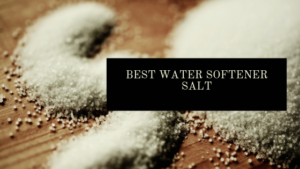What is the Best Salt For My Water Softener?

Salt is salt, right? When it comes to water softener salt, that statement isn’t exactly true. There are several different salt varieties, some of which are better for your water softener than others. Let’s take a look at the 3 most common types and the pros and cons of each.
Types of water softener salt
- Rock Salt – Typically mined underground, rock salt is salt in its rawest form. It is the result of many (like hundreds or thousands) years of accumulating salt deposits. It also contains traces of other minerals, so it is not 100% pure. For this reason, it is often cheaper than other types of salt.
While rock salt can be used in water softeners, it is not highly recommended. This is primarily because the other minerals included with it are not always water-soluble. This means they are left behind in your water softener’s brine tank and can build up over time. If rock salt is used in your home water treatment system, the tank will need to be cleaned on a regular basis to enable your system to continue to function properly.
- Solar Salt – Also known as sea salt, this product is the result of the evaporation of seawater. Salt crystals are typically harvested and then sold as pellets when their intended use is for water softeners. Solar salt has fewer impurities and dissolves faster than rock salt. It can, however, still lead to build up over time, even though it is purer.
- Evaporated Salt – This third type of salt commonly used in water softeners is the purest and most water-soluble. It is created by dissolving salty deposits in the water, and then removing all of the moisture from the brine. It is very effective in the treatment of hard water, and is the healthiest option for your home water softening system.
What happens when the wrong type of water softener salt is used?
Any of the three salt options above can be used for water softening. Using rock or solar salt, however, leads to a higher likelihood of the creation of a salt bridge versus using evaporated salt. A salt bridge is a buildup of salt crystals at the top of the tank and can interfere with your water softener’s functioning. It can be caused by several factors, including using salt with higher impurity levels.
Water softener maintenance
Regardless of what type of salt you choose to use in your home water softener, regular water softener maintenance is important for protecting your investment and extending its usable life. There are also maintenance-free water softening options available, such as our Portable Exchange Tank Service. Give us a call today and we’ll be happy to set you up with the best water softening system for your home, or help you maintain your existing system.


